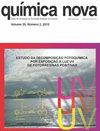FÓSSEIS MOLECULARES DA MATÉRIA ORGÂNICA SILURIANA DA FORMAÇÃO TIANGUÁ (BACIA DO PARNAÍBA), NORDESTE DO BRASIL: IMPLICAÇÕES PALEOAMBIENTAIS E MATURAÇÃO TÉRMICA
IF 0.5
4区 化学
Q4 CHEMISTRY, MULTIDISCIPLINARY
引用次数: 0
Abstract
MOLECULAR FOSSILS FROM SILURIAN ORGANIC MATTER OF THE TIANGUÁ FORMATION (PARNAÍBA BASIN), NORTHEASTERN BRAZIL: PALEOENVIRONMENTAL IMPLICATIONS AND THERMAL MATURATION. The Parnaíba Basin covers an area of 665,888 km2 between the northern and northeastern regions of Brazil. It is completely made up of siliciclastic sedimentary and volcanic rocks with ages varying between the Silurian and the Cretaceous. Among the formations of the Basin, the Tianguá Formation is considered a potential source rock. However, there are few geochemical and/or geological studies and no research work on the molecular parameters of the organic matter (OM) present in its outcropping rocks (OR). Thus, the objective of the present work is to characterize the OM, concerning the depositional paleoenvironment and the degree of thermal evolution, through molecular parameters and OM content. The OM was extracted using the Soxhlet system, chromatographed by classical methods, and analyzed using GC-MS and GC-MS/MS. The samples exhibited low total organic carbon values (TOC <1) and the molecular parameters of saturated and aromatic hydrocarbons suggested a marine depositional environment, with algae, bacteria, and terrestrial plants input. The C30 biomarkers (24-n-propylcholestane), identified using synthetic standards and usually associated with the Chrysophyte algae, corroborated the marine origin of the depositional environment. In addition, some molecular parameters suggested little thermal evolution.巴西东北部tiangua组志同道合有机物分子化石(parnaiba盆地):古环境影响与热成熟
巴西东北部tianguÁ组(parnaÍba盆地)志留系有机质分子化石:古环境意义与热成熟Parnaíba盆地位于巴西北部和东北部地区之间,面积为665,888平方公里。它完全由硅屑沉积岩和火山岩组成,年龄在志留纪和白垩纪之间变化。在盆地的地层中,天关组被认为是潜在的烃源岩。然而,对其露头岩有机质分子参数的地球化学和地质研究较少,对其露头岩有机质分子参数的研究较少。因此,本文的目的是通过分子参数和有机质含量来表征有机质的沉积古环境和热演化程度。OM采用索氏体系提取,经典色谱法进行色谱分析,GC-MS和GC-MS/MS分析。样品的总有机碳值较低(TOC <1),饱和烃和芳烃的分子参数显示为海洋沉积环境,有藻类、细菌和陆生植物输入。采用合成标准鉴定的C30生物标志物(24-n-丙基胆甾)通常与绿藻有关,证实了沉积环境的海洋来源。此外,一些分子参数表明热演化不大。
本文章由计算机程序翻译,如有差异,请以英文原文为准。
求助全文
约1分钟内获得全文
求助全文
来源期刊

Quimica Nova
化学-化学综合
CiteScore
1.60
自引率
12.50%
发文量
72
审稿时长
2-4 weeks
期刊介绍:
Química Nova publishes in portuguese, spanish and english, original research articles, revisions, technical notes and articles about education in chemistry. All the manuscripts submitted to QN are evaluated by, at least, two reviewers (from Brazil and abroad) of recognized expertise in the field of chemistry involved in the manuscript. The Editorial Council can be eventually asked to review manuscripts. Editors are responsible for the final edition of QN.
 求助内容:
求助内容: 应助结果提醒方式:
应助结果提醒方式:


